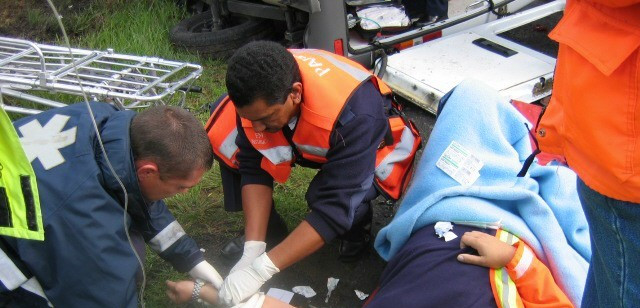At accident scenes all over South Africa, looting of the victims’ belongings or attacks on medical personnel are increasingly commonplace. This has prompted Mpho Mpogeng, president of the South African Emergency Personnel Union (SAEPU) to announce that his union members will henceforth arm themselves when responding to emergencies.
According to Mpogeng, they were not getting support from the police. When responding to emergencies in some black areas of the country, an armed escort is needed to protect emergency personnel against robberies and attacks.
During the festive season, SAEPU members will be carrying guns to defend themselves.
“We decided to do something about it. We’ve tried all the stakeholders, and they are not interested,” Mpogeng said. For the past three years, some emergency personnel such as paramedics and ambulance drivers have refused to go out at night, for fear of being attacked.
The CEO of a private emergency services company, Rajesh Mahabeer of Sharaj Ambulance and Rescue Services, said that his personnel too want guns, after they were robbed of cellphones, wallets and money in Ladysmith, Kwazulu-Natal province, on 14 November.
According to Mpogeng, “Enough is enough. If the behaviour in the community does not change, then the carrying of firearms must continue after the festive season.”
“We would like to carry guns, especially when we are going into the rural areas at 3 a.m.,” Mahabeer stated. We want to use them as a defence mechanism.”
His company had stopped assisting victims of drunken brawls in black townships, for fear of being attacked themselves. Without an armed police escort, they are at risk.
“Criminals know we don’t carry weapons and there are not enough police escorts, so sometimes, we have to wait at least two hours for the police to arrive,” Mahabeer said.
Other ambulance companies expressed similar fears and opinions. However, a spokesman for KwaZulu Private Ambulance Services, Colin Watson, described the carrying of firearms by paramedics as a “controversial topic”.
“It’s a grey area, and everyone has mixed emotions about it,” he stated. Some of their employees had been attacked too and others have been placed at risk.
“When we ask for an escort, we are told there are no [police] vans available,” Watson said.
Kwazulu Private Ambulance Services have adopted a policy not to go to an emergency scene if a shooting has taken place there.
“Some people ask what is our main role if we carry a firearm? Are we emergency services or SAPS?” Watson asked.
Similarly, Crisis Medical was opposed to issuing firearms to their personnel. spokesperson Kyle van Reenen said they would not issue firearms to their staff.
“It can place them in more danger,” said Crisis Medical spokesman Kyle van Reenen. “They could be treating a patient and next thing they are being robbed of their firearm.”
Before joining Crisis Medical, Van Reenen himself had been the victim of an attack and stabbing while out on an emergency call.
On the other hand, Crisis Medical would not ban the use of firearms altogether.
“We would not prevent a medic from carrying a concealed firearm if they have a licence and it is in line with the law,” Van Reenen said.
He was of the opinion that medical personnel should stay out of the line of fire if criminals or gangs open fire.
“Our medics are encouraged to retreat to a safe place if they feel threatened, but there is an area in the profession where people can treat the injured while under fire, and they can carry a firearm.”



No comments.
By submitting a comment you grant Free West Media a perpetual license to reproduce your words and name/web site in attribution. Inappropriate and irrelevant comments will be removed at an admin’s discretion. Your email is used for verification purposes only, it will never be shared.